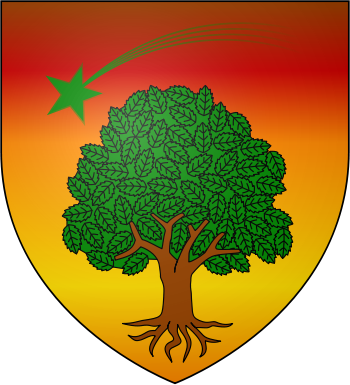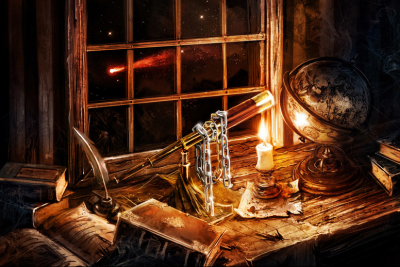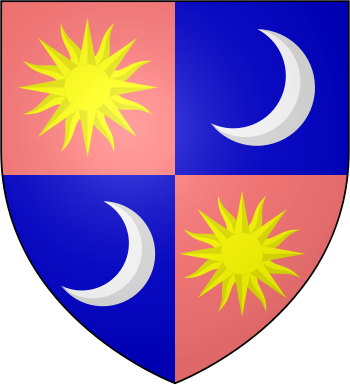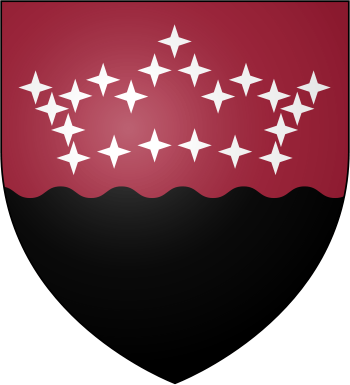Astronomy
Astronomy is a natural science that studies celestial objects and phenomena.[1] In the known world, astronomy plays a role in keeping track of time, as well as in religion.
The bronze link of a maester's chain[2][3] likely symbolizes his expertise in either astronomy or astrology.[N 1] Maester Nicol has studied the movement of the stars,[6] and Maester Luwin, in service at Winterfell during the rule of Lord Eddard Stark, has a Myrish lens tube through which he looks at stars in the sky.[7] Maester Luwin taught the Stark children about the stars, including "the names of the twelve houses of heaven and the rulers of each", the seven wanderers, and the constellations.[8]
Contents
The Sun and Moon
In the known world, a year is the length of a solar cycle, how long it takes the earth to make one complete revolution around the sun.[9][10] The world is also orbited by a moon, in a similar fashion to Earth's, which revolves around the world twelve times a year.[9] As on Earth, a year is measured by determining the position of the sun, moon, and stars.[10]
The known world experiences extremely long seasons of varying length, usually lasting at least a couple of years each. It is known that the daytime period is correlated with the seasons. Towards the end of summer, the days start to grow shorter,[11] a trend which continues through autumn.[12][13] The end of a season is determined by the Conclave of the Citadel, who base their conclusion on the measurements and reports of maesters all over the Seven Kingdoms.[14]
In his The Measure of the Days, Maester Nicol argues, based upon his studies on the movement of stars, that the seasons possibly were once of a regular length, determined by the way in which the globe faces the sun. According to Maester Yandel, however, although the notion appears to be true, Nicol has not been able to find any evidence that regular seasons were once the case, beyond the most ancient of tales.[6]
The Qartheen believe that there were once two moons in the sky. This second moon supposedly came too close to the sun and cracked like an egg hatching, releasing a million dragons.[15][16] The Dothraki believe that the moon is a goddess, wife to the sun.[15] A Dothraki husband may refer to his wife as "moon of my life", to which she responds, calling him "my sun-and-stars".[17]
In the faith of R'hllor, the Lord of Light, the red priests and other followers pray before a nightfire, thanking R'hllor for ending the day, while beseeching him to bring the dawn and banish the darkness.[18] The nightfires are lit at sunset.[18][19] Fires are also lit each morning at first light, where the red priests welcome the sun.[5] Other red priests might attend to their fires during the entire night.[20] A common phrase in this faith is "the night is dark and full of terrors".[14][5] A typical prayer includes the sequence,
Yours is the sun that warms our days, yours the stars that guard us in the dark of night.
(Lord of Light, defend us. The night is dark and full of terrors. Lord of Light, protect us.)
R'hllor who gave us breath, we thank you. R'hllor who gave us day, we thank you.
(We thank you for the sun that warms us. We thank you for the stars that watch us.
We thank you for our hearths and for our torches, that keep the savage dark at bay.)[18][N 2]
Stars and Constellations
Myrish eyes mounted on tripods can be used to observe the stars.[21] There are also dedicated observatories, including one kept at Winterfell by Luwin.[22] The maesters of the Citadel compile star charts for their research and studies.[7] Knowledge of the stars is useful in ocean navigation,[7] in particular the constellations of the Galley and the Crone's Lantern, and the star that is the eye of the Ice Dragon constellation.[18]
The Dothraki believe that the stars are the souls of the deceased, their brightness depending on their deeds during their lives.[23]
Constellations are the names given to a group of stars linked close together. They usually represent some sort of picture, but what this picture depicts may vary between different cultures. The free folk have many of the same names for constellations as the people of the Seven Kingdoms, although there are some differences. The King's Crown is named the Cradle by them, and the Stallion is named the Horned Lord.[8]
Known constellations
Names for only eleven constellations have been mentioned so far. There may be as many as twelve, if the constellations and the "houses of heaven" correspond to each other. However, if the twelve "houses of heaven" are equivalent to the zodiac signs, the Ice Dragon might not be one of them as it includes the pole star.
- Crone's Lantern[18][24]
- Galley[18][24]
- Ghost[24]
- Ice Dragon[18][24]
- King's Crown[24] (also known as the Cradle among the free folk)[8]
- Moonmaid[8][24]
- Shadowcat[8]
- Swan[25]
- Sow[24]
- Stallion[24] (also known as the Horned Lord among the free folk)[8]
- Sword of the Morning[8]
Planets and Other Moving Objects

There are seven wanderers in the sky over the known world, each of which are sacred to the Faith of the Seven and associated with one of the seven gods.[8] Each wanderer may be a planet, as the word "planet" is derived from the Greek word πλανῆται (planētai, which means "wanderers" or "wandering stars").[26][27] On Earth, the seven planets of antiquity included the Sun and Moon.[28]
One of the seven wanderers is the red wanderer, considered by the Faith of the Seven to be sacred to the Smith.[8] Among the free folk, the red wanderer is known as the Thief.[8][29][30]
Beyond these seven wanderers, other "wandering stars" have also been known to appear, such as comets and falling (or shooting) stars.
- According to legend, over ten thousand years ago,[31] the founder of House Dayne tracked a falling star to an island at the mouth of the Torentine, and discovered there a stone with magical powers. The castle of Starfall was constructed on that location,[32] and the Dayne ancestral greatsword, Dawn, was forged from the heart of this fallen star.[33]
- Ser Duncan the Tall spotted a green shooting star in the sky outside Ashford in 209 AC, and made it part of his sigil.[34]
- A comet was seen above King's Landing in 281 AC.[35]
- A red comet appears in the sky over Westeros and Essos in 299 AC.[36][7][23]
Seeing a falling star is considered to bring luck.[34] The prince that was promised is prophesied to be born beneath a "bleeding star",[37] which some believe to be a comet.[35] Azor Ahai is prophesied to be reborn when "the red star bleeds".[38]
Behind the Scenes
There was some attempt during the writing of The World of Ice & Fire to commission an artist's illustration of the major constellations and the houses of heaven known to the Maesters of the Citadel, but due to various complications the project was eventually dropped.[39]
Notes
References
- ↑ Wikipedia: Astronomy
- ↑ A Game of Thrones, Chapter 41, Jon V.
- ↑ A Game of Thrones, Chapter 20, Eddard IV.
- ↑ 4.0 4.1 A Feast for Crows, Appendix.
- ↑ 5.0 5.1 5.2 A Feast for Crows, Prologue.
- ↑ 6.0 6.1 The World of Ice & Fire, Ancient History: The Long Night.
- ↑ 7.0 7.1 7.2 7.3 A Game of Thrones, Chapter 66, Bran VII.
- ↑ 8.0 8.1 8.2 8.3 8.4 8.5 8.6 8.7 8.8 8.9 A Storm of Swords, Chapter 26, Jon III.
- ↑ 9.0 9.1 So Spake Martin: Asshai.com Forum Chat (July 27, 2008).
- ↑ 10.0 10.1 So Spake Martin: Measuring Time (June 12, 1999).
- ↑ A Game of Thrones, Chapter 21, Tyrion III.
- ↑ A Feast for Crows, Chapter 20, Brienne IV.
- ↑ A Dance with Dragons, Chapter 21, Jon V.
- ↑ 14.0 14.1 A Clash of Kings, Prologue.
- ↑ 15.0 15.1 A Game of Thrones, Chapter 23, Daenerys III.
- ↑ The World of Ice & Fire, Ancient History: The Rise of Valyria.
- ↑ A Game of Thrones, Chapter 46, Daenerys V.
- ↑ 18.0 18.1 18.2 18.3 18.4 18.5 18.6 A Storm of Swords, Chapter 63, Davos VI.
- ↑ A Game of Thrones, Chapter 3, Daenerys I.
- ↑ A Dance with Dragons, Chapter 33, Tyrion VIII.
- ↑ A Storm of Swords, Chapter 69, Jon IX.
- ↑ A Game of Thrones, Chapter 5, Jon I.
- ↑ 23.0 23.1 A Game of Thrones, Chapter 72, Daenerys X.
- ↑ 24.0 24.1 24.2 24.3 24.4 24.5 24.6 24.7 The Sworn Sword.
- ↑ A Storm of Swords, Chapter 31, Jaime IV.
- ↑ Definition of planet by Merriam-Webster (retrieved on May 19, 2018)
- ↑ Define Planet at Dictionary.com (retrieved on May 19, 2018)
- ↑ Wikipedia: Classical planet
- ↑ A Feast for Crows, Chapter 15, Samwell II.
- ↑ A Dance with Dragons, Chapter 35, Jon VII.
- ↑ A Feast for Crows, Chapter 21, The Queenmaker.
- ↑ The World of Ice & Fire, Dorne: Kingdoms of the First Men.
- ↑ A Clash of Kings, Chapter 21, Bran III.
- ↑ 34.0 34.1 The Hedge Knight.
- ↑ 35.0 35.1 A Feast for Crows, Chapter 35, Samwell IV.
- ↑ A Clash of Kings, Chapter 6, Jon I.
- ↑ A Feast for Crows, Chapter 45, Samwell V.
- ↑ A Storm of Swords, Chapter 25, Davos III.
- ↑ Reddit AMA, March 2015


